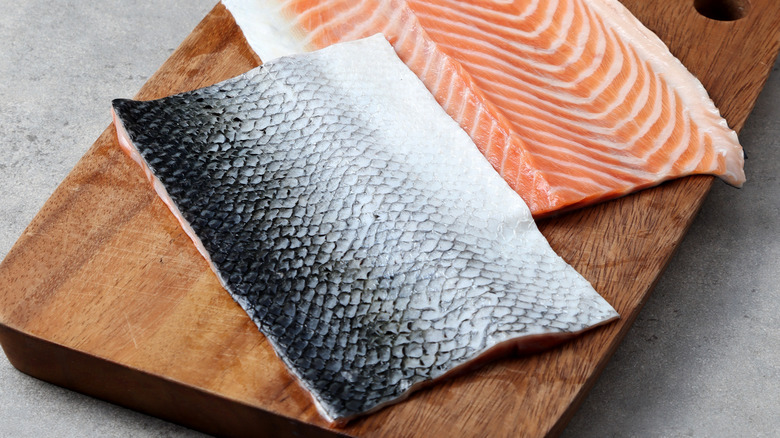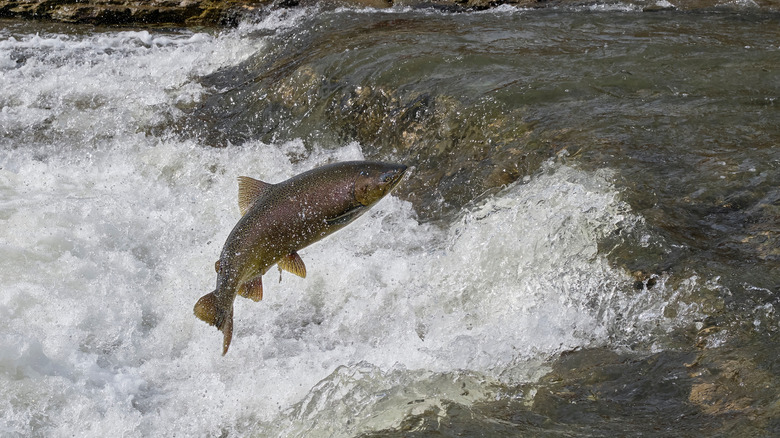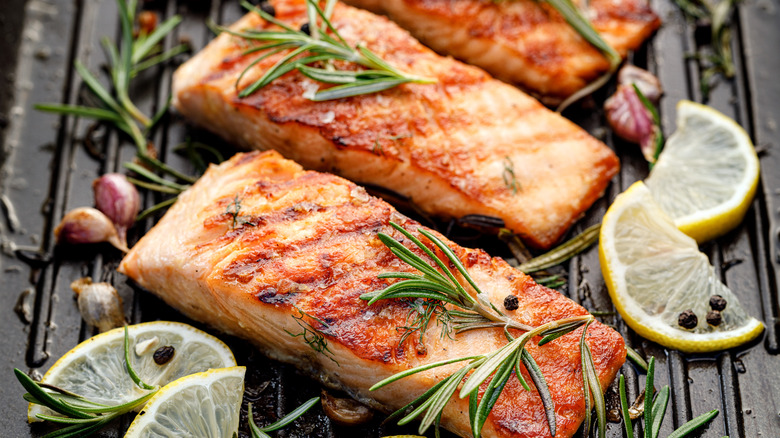Should You Be Eating Salmon Skin?
Growing up, you were likely told that chicken skin was bad for you — even when it was lovingly encrusted with a mouth-watering extra crispy coating. On the flip side, the potato's skin (we love potato skins) was packed with nutritional goodness and should, therefore, be consumed at every opportunity. Orange peels make perfect zest, but melon skins can contain E. coli (via Michigan State University). When it comes to flesh, skin, rinds, or peels, it seems that we have to determine what we can eat and what we cannot on a case-by-case basis.
This brings us to salmon. According to the National Fisheries Institute, salmon is America's number two seafood choice with the average citizen devouring 3.1 pounds each year. Shrimp came in first at 4.7 pounds (per Seafood Source). As shrimp are not fish, that makes salmon the nation's favorite fish. National Geographic adds that the United States eats 450,000 tons of salmon annually. And Bloomberg states that Americans are expected to purchase over $775 million worth of canned salmon this year. Clearly, this is a nation of salmon lovers.
This penchant for the fish that swims against the current raises an important question. Should you eat salmon skin?
Before eating salmon skin, find out where the fish comes from
When it comes to whether or not you should devour that pan-crisped salmon skin, the answer is a wee bit confusing. Apparently, it all depends on what place your salmon calls home. If it grew up within the confines of a fish farm, it is said that you should forgo eating its skin. But, if your fish spent its formative years frolicking freely in the ocean's waters, you can feel free to dig in. A study by Indiana University showed that farmed salmon contain significantly more contaminants (including known carcinogens) than their wild counterparts. Clearly, no one wants to chomp down on a mouthful of PCB and mercury and, really, who knows what else. Pregnant women are advised to give salmon a wide berth for this reason.
While wild salmon are the wisest choice, Wide Open Eats does offer an important caveat — salmon caught in the Atlantic may still contain harmful toxins. The best choice is a freewheeling fish from the Pacific.
But what if you're not pregnant and your fish hails from the Pacific waters and, therefore, possesses safe-to-consume skin? Are there any compelling reasons to eat the skin other than the fact that it's delicious? If you long for a planked salmon with dill and lemon, and its skin, too, this will help you make up your mind.
Salmon skin packs a heavy nutritional punch
Salmon skin (devoid of cancer-causing agents, of course) offers a myriad of health benefits. The Chopping Block explains that salmon tend to have more fat than other fish as they prefer to reside in cold water, and much of this fat is in the skin. While the word "fat" usually sends up red flags, in this case, they are good fats rich in Omega-3. And, the skin is also an excellent source of collagen (yes, the compound that fights wrinkles and sagging. Yay!).
Health Digest adds that salmon skin boasts benefits like "phosphorus, potassium, and vitamin D." The Mayo Clinic emphasizes the importance of vitamin D — otherwise known as the sunshine vitamin — stating it facilitates the absorption of calcium, oversees your cell's activities, reduces inflammation, aids your immune system, and supports brain health.
Clearly, the right salmon skin offers important nutritional benefits. Just remember, before biting into the perfectly-crisped epidermis of your grilled salmon, find out where it comes from. This answer will determine whether your salmon's skin is your friend or your foe.


